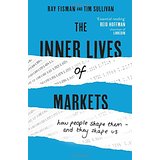The Inner Lives of Markets: How People Shape them and they Shape Us
In last week’s blog we covered David Sneddon’s talk at the STA’s June monthly meeting. You can read this on www.technicalanalysts.com where members can also view a video recording of the presentation. Starting with a proprietary risk asset tool designed by his Credit Suisse colleagues he overlays some fundamental data to see if these confirm the technicals behind them. I, like many others no doubt, found the concept interesting and his frankness in deviating from pure technical analysis refreshing.
At the risk of over-egging the pudding I thought readers might be interested in this new book by Columbia economics professor Ray Fisman and Harvard Business School Press’ Tim Sullivan [ISBN 9781444788617]. They examine various markets over the ages – and not just financials but illegal ones and barter in prisons – concluding that ‘the very definition of what constitutes a market has changed. Economists no longer limit themselves to money.’
 Waterstones (bookshop) in its review says they argue for a new way of thinking about how to spend one’s money, that every transaction is part of a grand social experiment; the sooner we realise this the more effectively we can navigate the path we want. The authors say, ‘it’s easy to conceptualise markets where we have complete knowledge of prices, quality and everything else. But once you recognise the existence of imperfect information, we have to specify who knows what, when.’
Waterstones (bookshop) in its review says they argue for a new way of thinking about how to spend one’s money, that every transaction is part of a grand social experiment; the sooner we realise this the more effectively we can navigate the path we want. The authors say, ‘it’s easy to conceptualise markets where we have complete knowledge of prices, quality and everything else. But once you recognise the existence of imperfect information, we have to specify who knows what, when.’
Via technical analysis I learnt a long time as that there is no such thing as being ‘out of the market’ – ‘square’ as traders say; every action, and lack of, impacts markets – and not just prices. Likewise gaps in our knowledge can be patched up because charts tell a story; we learn how to read them and interpret what they are trying to tell us.
All too often markets behave in extraordinary ways because they are irrational, and most old hands of whatever discipline know that. The FT’s US managing editor Gillian Tett in her review of the book sums up thus: ‘market theory may seem pre-eminent now; but if…companies that control the platforms take that for granted, they could face a nasty future shock’.
Tags: discovery, Knowledge
The views and opinions expressed on the STA’s blog do not necessarily represent those of the Society of Technical Analysts (the “STA”), or of any officer, director or member of the STA. The STA makes no representations as to the accuracy, completeness, or reliability of any information on the blog or found by following any link on blog, and none of the STA, STA Administrative Services or any current or past executive board members are liable for any errors, omissions, or delays in this information or any losses, injuries, or damages arising from its display or use. None of the information on the STA’s blog constitutes investment advice.
Latest Posts
- Avoid Revenge Trading: The Key to Long-Term Trading Success March 31, 2025
- Mastering Relative Strength Portfolios: Key Takeaways from the March STA Meeting March 12, 2025
- Stay Disciplined, Stay Profitable February 26, 2025
- Understanding Price Gaps in Trending February 19, 2025
- Key Takeaways from a Fireside Chat with Perry Kaufman February 12, 2025




















Latest Comments